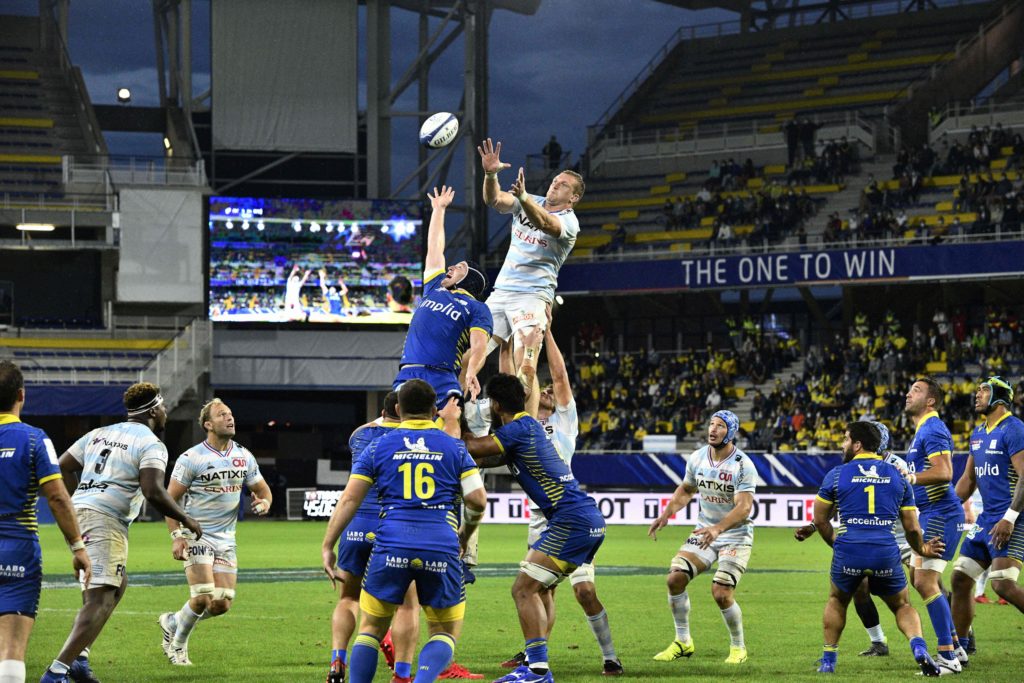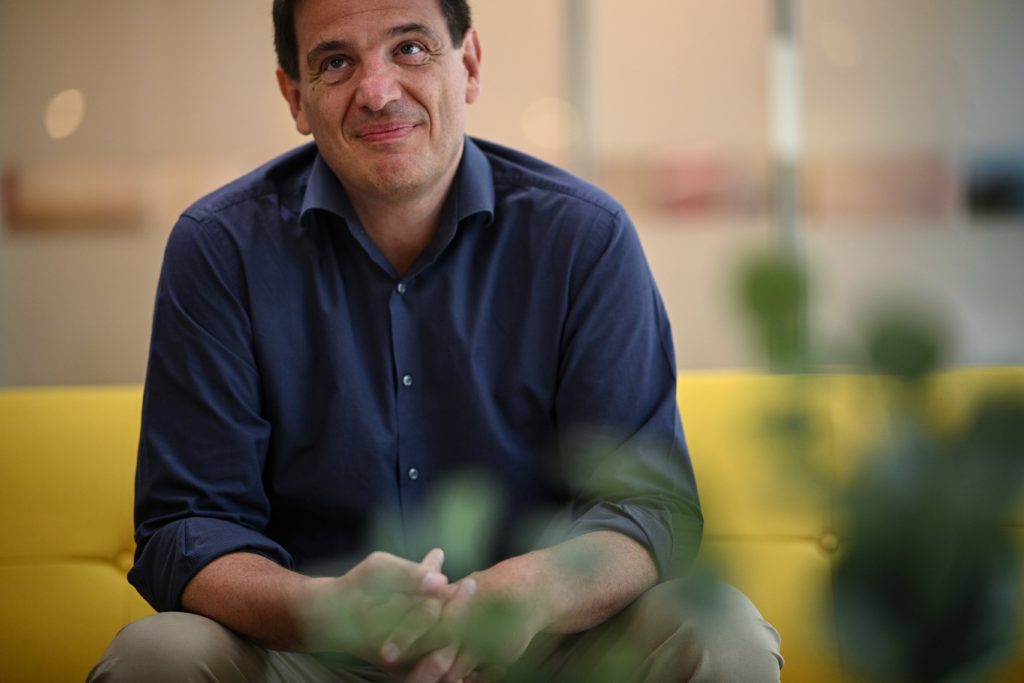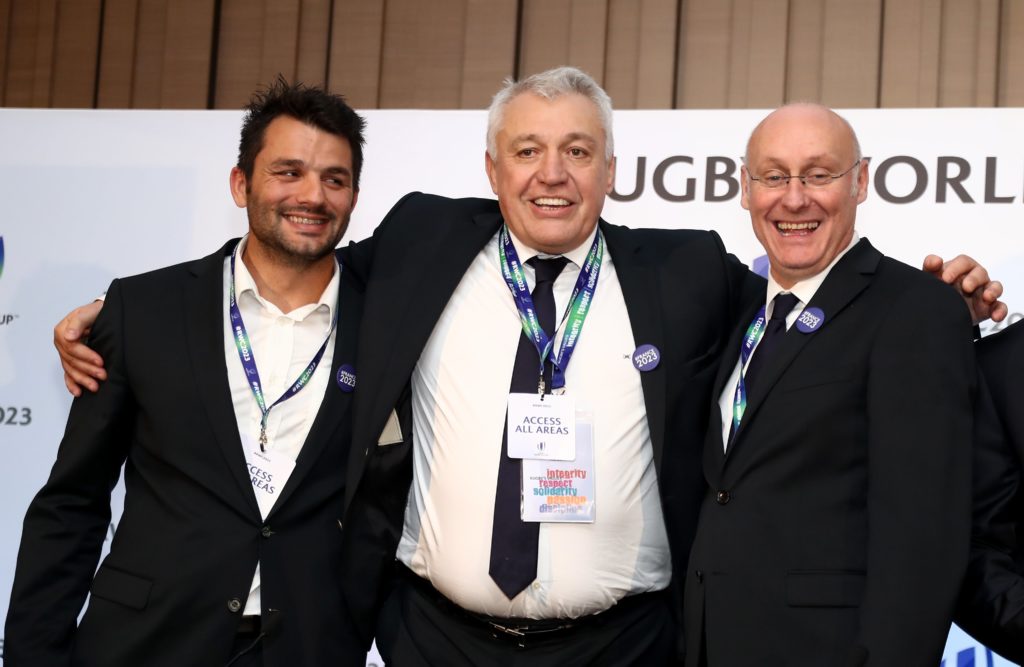There should be a smile on the face of French rugby this week. Toulouse and Racing 92 reached the semi-final of the Champions Cup with powerful performances at the weekend, and there were standout displays from a number of this generation of young and exciting French players.
But French rugby doesn’t work like that. Increasingly, what unfolds on the field of play is a sub-plot to the drama in boardrooms and lawyers’ offices; and possibly even the courtroom? On Tuesday FFR president Bernard Laporte was taken into custody by investigators probing allegations of malfeasance within the organisation. Also detained were Serge Simon, the FFR vice-president, Nicolas Hourquet, responsible for international relations, Claude Atcher, director general of France’s 2023 RWC campaign and Mohed Altrad, the owner of Montpellier.
Open an issue of Midi Olympique, the twice-weekly rugby newspaper, and words such as “confrontation”, “catastrophic” and “indignation” leap from the page. As the paper’s editorial noted wryly on July 31: “We’ve all seen the bickering and infighting without which our rugby would not be truly French. What other country arrives, chest puffed out, to a major meeting of World Rugby with so much divergence: the national coach arguing differently to the FFR, itself in opposition to the LNR or the clubs?”
Midi Olympique concluded that Charles de Gaulle was right when he memorably proclaimed that a country that boasts 246 cheeses is “ungovernable”.
Midi Olympique concluded that Charles de Gaulle was right when he memorably proclaimed that a country that boasts 246 cheeses is “ungovernable”.
Of course, every rugby nation is suffering from the coronavirus crisis but in France the situation is particularly acute because of the long history of polarised politics within the sport. Egos abound, from the tycoons who own the clubs to the presidents of the FFR [Bernard Laporte] and LNR [Paul Goze] to the head coach, Fabien Galthié. These are men who enjoy the sound of their own voice.
The decision of World Rugby, supported by the FFR and Galthié, to schedule six Tests between October 24 and December 5 [with one weekend of rest] enraged the LNR [Ligue Nationale de Rugby], and one can sympathise with their sentiment.
 Clermont Auvergen” class=”wp-image-1706″ />
Clermont Auvergen” class=”wp-image-1706″ />Twelve months ago they were without a number of their big names because of the World Cup, and barely had they returned to club action than the Top 14 was shut down by coronavirus for six months with the 2019-20 season abandoned. Now they are expected to release their international players for six Tests instead of the usual three; the clubs offered a compromise of five but the FFR are adamant it must be the full complement – call it France’s own ‘Rule of Six’.
The clubs are furious with this intransigence and have warned it will cause “considerable economic harm to clubs already badly hit by the Coronavirus health crisis”. Last week they voted unanimously to launch legal action against the French Federation.
Last week the clubs voted unanimously to launch legal action against the French Federation.
The FFR are also suffering the financial fallout from the virus and, mindful that they are hosting the Rugby World Cup in three years, they are desperate to make up for the lost revenue. There’s also the little matter for the FFR of a €3.3 million fine imposed on them in July by a Versailles court for their abandonment in 2017 of the Grand Stade project. Laporte scrapped the planned new national stadium on becoming president of the FFR, and that resulted in a court case brought by the regional council in Essonne, south of Paris, where the new stadium had been envisaged by Laporte’s predecessor, Pierre Camou.
The new season began three weeks ago with stadiums limited to a maximum crowd of 5,000, a threshold that won’t be reviewed again until October 30. But a number of clubs have in the past fortnight been ordered to reduce this capacity to 1,000 because of a resurgence in coronavirus infections. Last week it was Bordeaux, and this week Toulouse and Lyon have been instructed by their city councils that no more than 1,000 spectators are permitted
“It’s a catastrophe”, declared Laurent Marti, president of Bordeaux recently. The Stade Chaban-Delmas, for example, can accommodate 34,000 fans (in 2018-19 Bordeaux had the highest average home attendance in the Top 14 with 20 409) and Marti offers a pessimistic prognosis. “A club like ours can’t survive but we’re not the only ones in this situation,” he said. “The public and our [commercial] partners represent 65% of our turnover.”

The disputes have added a piquancy to the campaign to elect the president of the FFR on October 3. Laporte is confident he will be handed a second mandate, four years after he replaced the divisive Camou as president, and he is taking a tough line with the professional clubs to curry favour with the influential amateur clubs, whose vote he needs if he is to triumph next month.
Laporte campaigned in 2016 as the man who would heal the divisions in French rugby but that hasn’t happened, and his challenger this year is Florian Grill, who counts Thomas Castaignede among his backers. “Florian, like his [campaign] team, knows how to listen, how to be attentive to the volunteers who are in the field building the rugby of tomorrow,” said Castaignede recently, adding that he regretted the “sorry state” of the relationship between the FFR and the LNR.
Grill portrays himself as the antithesis of Laporte, the cool Parisian to ‘Crazy Bernie’ from the deep south of the country. “The management of Bernard Laporte is one of extreme violence,” claimed Grill in an interview with L’Equipe last month, citing the manner in which he abandoned the Grand Stade project and fired Guy Noves as national coach.
The timing is unfortunate but that won’t worry Laporte unduly; as a member of Nicolas Sarkozy’s government in 2007 he has plenty of experience of political intrigue.
Laporte is the favourite but how significant might events be this week on the chances of his re-election? His detention on Tuesday by the the anti-fraud squad as part of their investigation into his relationship with Montpellier owner Mohed Altrad has caused a sensation in the media. Of particular interest to investigators is the allegation that Laporte put pressure on the FFR appeals committee to reduce a sanction against Montpellier for a breach of the salary cap in the 2016-17 season. His company – BL Communication – and Altrad signed an image rights contract in 2017 and although Laporte withdrew from the €150,000 deal it was only after the French Sports Ministry had called in the public prosecutor. Montpellier were docked €400,000 for the same reason in 2017-18 but last November the fine was overturned on appeal.

His relationship with Altrad isn’t the only reason Laporte is being investigated. According to a report in last month’s ‘Le Canard enchaîné’ – France’s equivalent of Private Eye – the anti-fraud squad (or the Brigade de répression de la délinquance économique to give them their official name] want to know more from Laporte about the “conditions of how France was awarded the 2023 World Cup”
Laporte’s lawyer, Jean-Pierre Versini-Campinchi, believes it’s no coincidence that his client is being questioned about these matters just a week before the presidential vote. “The judicial interference in the election campaign is very concerning,” he said on Monday evening. Another unnamed member of Laporte’s entourage claimed on Tuesday that his boss is the victim of a “media vendetta”
According to the media the original intention was to question Laporte in March but coronavirus swept in and investigators were forced to reschedule. The timing is unfortunate but that won’t worry Laporte unduly; as a member of Nicolas Sarkozy’s government in 2007 he has plenty of experience of political intrigue.
‘Sarko’, as the former president was known, acquired a reputation for sailing close to the wind during his presidency and it appears Laporte is following in his mentor’s wake.


Comments
Join free and tell us what you really think!
Sign up for free